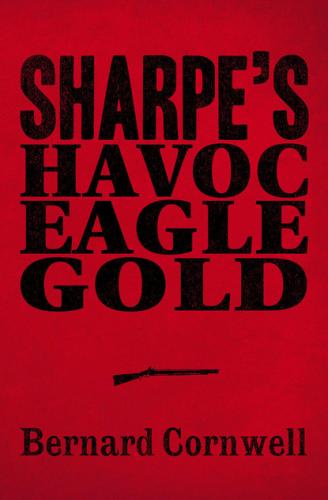And that meant the French would come at dawn.
And the light grew, wan and grey and pale as death, and the tops of the highest clouds were already golden red as the light changed from grey to white and white to gold and gold to red.
And then the killing began.
‘Sir! Mister Sharpe!’
‘I see them!’ Dark shapes melding into the dark shadows of the northern slope. It was French infantry or, perhaps, dismounted dragoons, coming to attack. ‘Rifles! Make ready!’ There were clicks as Baker rifles were cocked. ‘Your men don’t fire, understand?’ Sharpe said to Vicente.
‘Of course,’ Vicente said. The muskets would be hopelessly inaccurate at anything more than sixty paces so Sharpe would keep the Portuguese volley as a final defence and let his riflemen teach the French the advantages of the seven lands and seven grooves twisting the quarter turn in the rifle barrels. Vicente was bouncing up and down on the balls of his feet, betraying the nervousness he felt. He fingered one end of his small moustache and licked his lips. ‘We wait till they reach that white rock, yes?’
‘Yes,’ Sharpe said, ‘and why don’t you shave that moustache off?’
Vicente stared at him. ‘Why don’t I shave my moustache?’ He could scarcely believe his ears.
‘Shave it off,’ Sharpe said. ‘You’d look older. Less like a lawyer. Luis would do it for you.’ He had successfully taken Vicente’s mind off his worries, and now he looked east where a mist hung over the low ground. No threat from there, he reckoned, and he had four of his riflemen watching the southern path, but only four because he was fairly certain that the French would concentrate their troops on one side of the hill and, once he was absolutely certain of that, he would bring those four back across to the northern side and let a couple of Vicente’s men guard the southern path. ‘When you’re ready, lads!’ Sharpe called. ‘But don’t fire high!’
Sharpe did not know it, but the French were late. Dulong had wanted his men closed up on the summit approach before the horizon turned grey, but it had taken longer than he anticipated to climb the dark slope and, besides, his men were befuddled and tired after a night of chasing phantoms. Except the phantoms were real and had killed one gunner, wounded three more and put the fear of God into the rest of the artillery crew. Dulong, ordered to take no prisoners, felt some respect for the men he faced.
And then the massacre began.
It was a massacre. The French had muskets, the British had rifles, and the French had to converge on the narrow ridge that climbed to the small summit plateau and once on the ridge they were easy meat for the rifles. Six men went down in the first few seconds and Dulong’s response was to lead the others on, to overwhelm the fort with manpower, but more rifles cracked, more smoke drifted from the hilltop, more bullets thumped home and Dulong understood what he had only appreciated before through lectures: the menace of a rifled barrel. At a range where a full battalion musket volley was unlikely to kill a single man, the British rifles were deadly. The bullets, he noticed, made a different sound. There was a barely detectable shriek in their whiplike menace. The guns themselves did not cough like a musket, but had a snap to their report, and a man struck by a rifle bullet was thrown back further than he would have been by a musket ball. Dulong could see the riflemen now, for they stood up in their rock pits to reload their damned guns, ignoring the threat of the howitzer’s shells that sporadically arced over the French infantry’s heads to explode on the crest. Dulong shouted at his men to fire at the green-jacketed enemy, but the musket shots sounded feeble and the balls went wide and still the rifle shots slashed home and his men were reluctant to climb onto the narrow part of the ridge so Dulong, knowing that example was all, and reckoning that a lucky man might possibly survive the rifle fire and reach the redoubts, decided to set an example. He shouted at his men to follow, drew his sabre and charged. ‘For France,’ he cried, ‘for the Emperor!’
‘Cease fire!’ Sharpe shouted.
Not one man had followed Dulong, not one. He came alone and Sharpe recognized the Frenchman’s bravery and, to show it, he stepped forward and raised his sword in a formal salute.
Dulong saw the salute, checked and turned and saw he was alone. He looked back to Sharpe, raised his own sabre, then sheathed it with a violent thrust that betrayed the disgust he felt at his men’s reluctance to die for the Emperor. He nodded at Sharpe, then walked away, and twenty minutes later the rest of the French were gone from the hill. Vicente’s men had been formed in two ranks on the tower’s open terrace, ready to fire a volley that had not been needed, and two of them had been killed by a howitzer shell, and another shell had slammed a piece of its casing into Gataker’s leg, gouging a bloody path down his right thigh, but leaving the bone unbroken. Sharpe had not even registered that the howitzer had been firing during the attack, but it had stopped now, the sun was fully risen and the valleys were flooded by light and Sergeant Harper, his rifle barrel fouled by powder deposits and hot from firing, had made the day’s first pot of tea.
Конец ознакомительного фрагмента.
Текст предоставлен ООО «ЛитРес».
Прочитайте эту книгу целиком, купив полную легальную версию на ЛитРес.
Безопасно оплатить книгу можно банковской картой Visa, MasterCard, Maestro, со счета мобильного телефона, с платежного терминала, в салоне МТС или Связной, через PayPal, WebMoney, Яндекс.Деньги, QIWI Кошелек, бонусными картами или другим удобным Вам способом.
